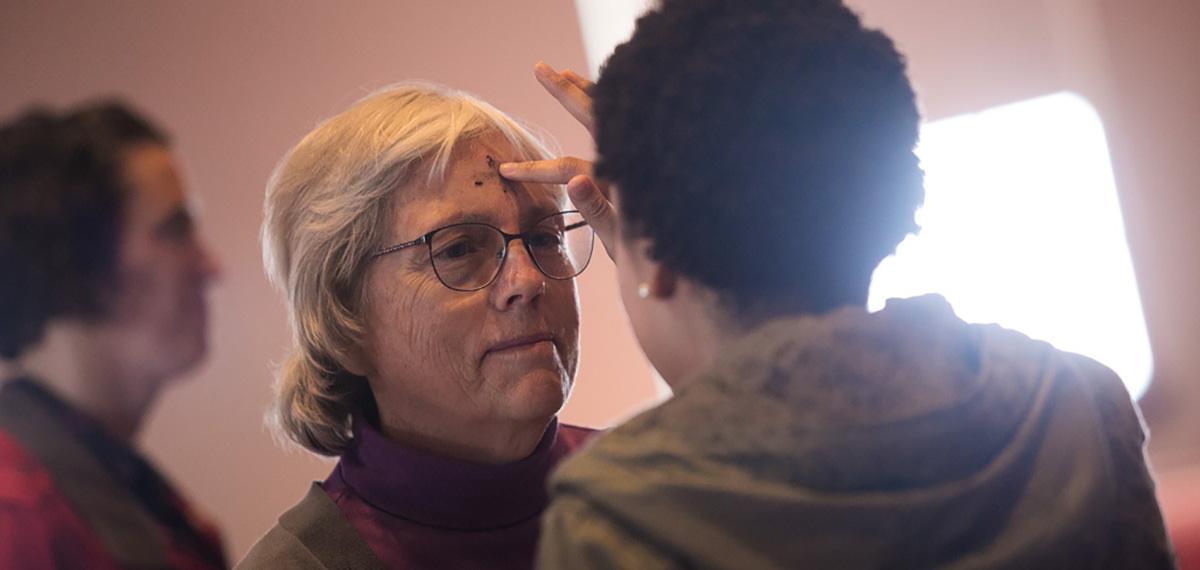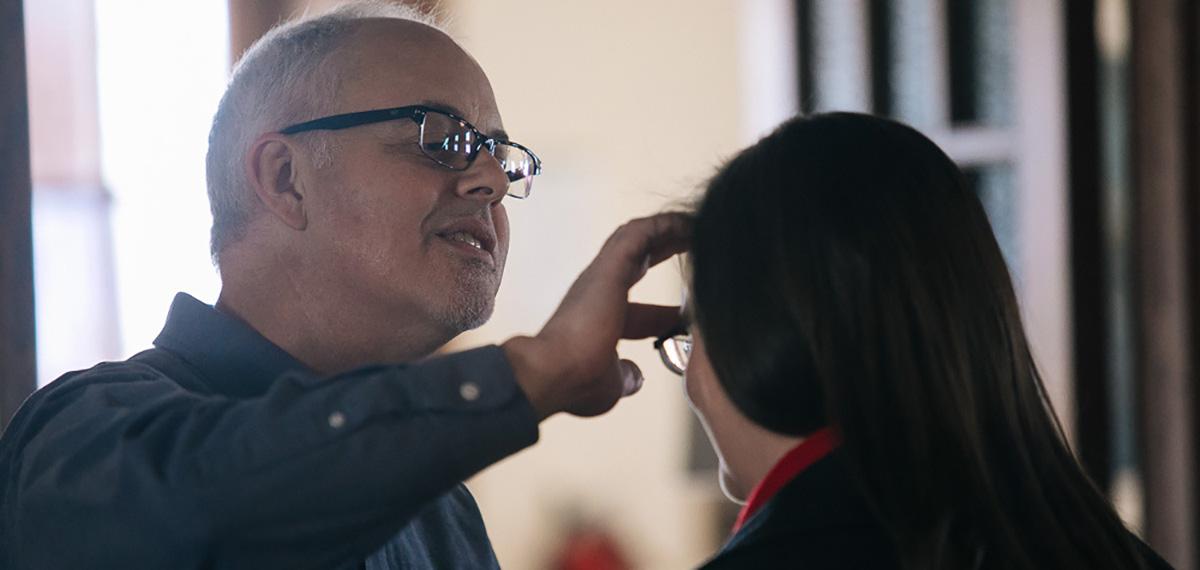Lent at EMU
Read student reflections on Lent below
Caleb Shrock-Hurst | Grayson Mast | Lydia Haggard | Gabriel Dodd
Lent Reflection- Caleb Schrock-Hurst, SGA co-president
The most important thing Lent has taught me is that it’s alright to not say ‘hallelujah.’
The church can act too happy. Too often I see people smiling when they want to cry, people praising when they want to mourn, people pretending that this whole Jesus thing is enough for them even when tragedy is striking time and time again, people hiding their real feelings and somehow thinking that is faith. It reeks of dishonesty.
Lent is all about dispelling this notion — that it all has to be ok, that we must smile through everything. In Lent we hear that we are dust, and that to dust we will return. There is no ‘hallelujah’ here; there is pain, contemplation, confusion, regret, and anger, but no happiness. Lent teaches that it’s alright to feel hurt and desperation, that all humans are mortal and that God made it this was. Lent teaches that life is supposed to hurt, that faith allows and embraces pain, and that denying that confusion and mortality is denying the very reason God took on flesh: to know our pain. Lent lets us morn and contemplate together.
When life hurts, in and out of Lent, I never force out a ‘hallelujah,’ and that makes all the difference. In Lent we embrace the confusion, the realness, the mortal flesh, and we emerge the wiser for it, mourning and rejoicing together as the seasons change.
Lent Reflection- Grayson Mast
Grayson Mast, senior biology major, offered these thoughts during an Ash Wednesday chapel service.
I believe that confessing our sins is important, as it allows us to acknowledge the problems that exist in the world, especially the problems that may, at least to some extent, be the result of the way that each of us personally live. Once we acknowledge our imperfections, we can begin working to repair the brokenness that we have perhaps created, with the expectation that we will receive grace and guidance from God. In Psalm 32: 5 we read, “Then I acknowledged my sin to you and did not cover up my iniquity. I said, ‘I will confess my transgressions to the Lord.’ And you forgave the guilt of my sin.”
It seems to me that we fear confessing our sin because it requires us to be vulnerable and expose the entirety of who we are to God. As Christians, it is important to remember the words of Colossians 1: 22-23 and Hebrews 4:15-16, which read, “But now he has reconciled you by Christ’s physical body through death, to present you holy in his sight, without blemish and free from accusation” and, “For we do not have a high priest,” this high priest being Jesus, “who is unable to empathize with our weaknesses, but we have one who has been tempted in every way, just as we are- yet he did not sin. Let us then approach God’s throne of grace with confidence, so that we may receive mercy and find grace to help us in our time of need.” We see through these scriptures that we do not have to fear confessing our sins. When we humble ourselves before God, we can trust that we will receive grace for our imperfections.
I recently met with a member of the campus ministries team who has made a regular practice of confession with a spiritual leader in his community. He shared specifically that he is confessing his sins to God in front of this spiritual leader so that someone asks him probing questions about his life, in hopes that he might receive a better understanding of himself and the things that obstruct his relationships with others and God. He compared this experience to a therapist working with a client. The therapist allows the client to better understand their own life and begin taking steps toward solving the problems that the client faces. I confess, I’m jealous of him. It must be awesome to experience such accountability. He further suggested that he feels as though this time allows him to “refuel,” spiritually. It is through his confession and the experience of the grace that Christ extends to him, that he is compelled to lead a better life.
Perhaps some of you are wondering why I believe that we have to confess our sins to a divine being to do good in the world, as if one could not perform benevolent acts as a non-believer. This is a legitimate proposition, but I invite you to consider the following thoughts:
If Jesus was truly the Son of God, which I believe to be true, he left his perfectly comfortable existence in heaven, with God, to come to this horribly flawed world. He then lived a sinless life before he died a horrible death, so that we could be reconciled to God, even though we were the reason the relationship was broken in the first place. Jesus’ life and death are perhaps the only human actions that I can justify to myself as entirely altruistic. He had nothing to gain by coming to earth. Jesus’ had no conflict of interest, as nothing could be more fulfilling than being with God. While in heaven with God, Jesus was the ultimate Dreamer, with the exception that his comfort was not constructed by the destruction of humans, but rather the glory of God. But, if the verses in Revelation accurately describe heaven, the streets of Jesus neighborhood were literally made of gold. But that didn’t keep Jesus from coming to the dirt roads of earth, and embracing our struggles as humans. This kind of love is what compels me to my belief in Christ. It is why I desire to live a repentant life, and as Christians, it is why we have to enter into the struggles of the world. It’s also why EMU places such a strong emphasis on social justice issues. As we enter into these struggles, let us not forget that it is Christ who sets the best example of selfless living. If we lose sight of Jesus, then we lose sight the most genuine love that ever existed. To place limitations on our relationship with Christ, God, and the Holy Spirit is to place limitations on our ability to experience the motivation that stems from a relationship with the most loving and selfless person who ever lived, the Creator of our universe, and the Spirit of God that now fills our hearts.
As we prepare for this season of Lent, perhaps the ashes can mark our own mourning of the pain that our sins have caused; and, further, symbolize the work that still needs to be done so that we can all live in harmony with God’s intention for all of creation.
My challenge for us today is to confess our sins, both our sins of commission and omission, to ourselves, God, and the members of the communities in which we are involved. My hope is that we do this with the expectation of experiencing grace and motivation to move from spaces of comfort into the uncomfortable spaces that Christ calls us to. May we do this in order to promote justice, equity, and peace in the world; so, that others may seamlessly experience the abundance of joy that comes from the perfect grace that is afforded us through a relationship with Jesus.
Lent Reflection- Lydia Haggard
Lydia is a sophomore, Bible and Religion major.
Before the celebration of Easter, we are invited to travel the painful road of suffering. This Lent season, I am especially aware of the grieving on EMU’s campus regarding faculty and staff cuts. Additionally, since Ash Wednesday, two of the Bible and Religion faculty have lost loved ones. Suffering seems especially present in this time and space. What are we to do with it?
Towards the end of his ministry, Jesus encourages his followers: “I have told you these things, so that in me you may have peace. In this world you will have trouble. But take heart! I have overcome the world.” (John 16:33, NIV)
Jesus does not explain why there is trouble in the world, but rather assures his followers that they will find peace despite the suffering. He also points to his resurrection as God’s act of overcoming a world that contains suffering.
We may not understand the reason of suffering, but we do have the assurance of God’s presence and God’s goodness. Grieving is part of the human experience. At the same time, we are invited to trust the promises of God that allow us to live in peace and hope. “Remember that you are dust and to dust you will return.” This iteration is a reminder of our human mortality. But we are also to remember that God has breathed into us, gifting us with spiritual life today and forever.
Lent Reflection- Gabriel Dodd
Gabriel Dodd is in his final semester at Eastern Mennonite Seminary.
“After he [Jesus] had dismissed them, he went up on a mountainside by himself to pray. Later that night, he was there alone…” (MT 14:21)
The middle of the semester seems to always be the most stressful. We are in the midst of studying for mid-term exams and writing those first papers. When we check the syllabus, though, we realize that although half of class time is over, most of the assignments are ahead of us. It surely is busy, and filled with anxiety. At least, that is my experience. If you have found this blog, you may have some interest in escaping from all of that.
In this season of Lent, I find it appropriate to “rest” from school work and to draw close to God. This is what the season is all about.
How can we be intentional about being closer to God? It may just seem like one more thing to do, but isn’t it the most important?
Here is one simple prayer I have found helpful: “God, what is keeping me from drawing close to you today? Help me remove the junk in my life so I can be more focused, and find joy in my work. You are awesome.”
It is easy to highlight the text, hit CTRL C + CTRL V, and cut and paste this prayer several times on a Word document. Then hit print, cut each text apart, and place the paper strips in different places you might see them and read them during the day.
After all, even Jesus escaped the business of his life to spend time with God!











